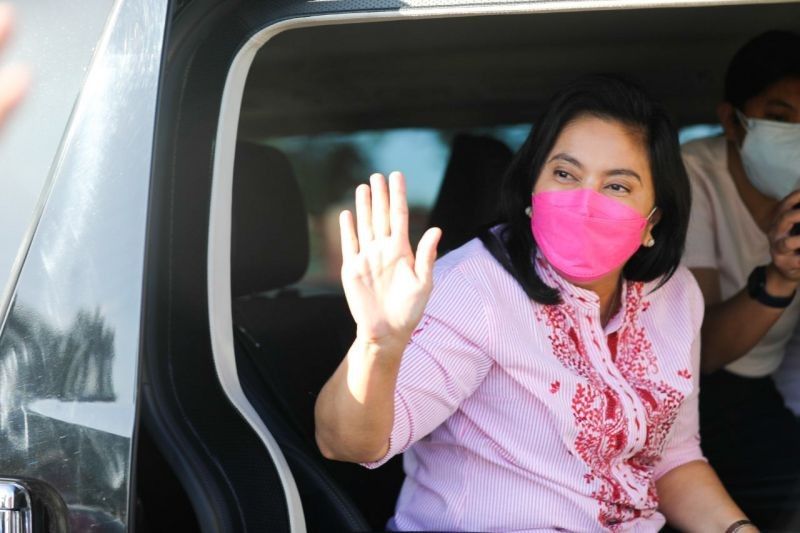Robredo hopes full decision on anti-terrorism law will resolve petitioners’ concerns

MANILA, Philippines — Vice President Leni Robredo said she is hoping that the full decision of the Supreme Court on the Anti-Terrorism Act of 2020 will resolve the concerns of the petitioners against the heavily assailed law feared to have a lasting impact on civil liberties in the Philippines.
“We are hopeful that the rest of these concerns will be substantially resolved in the full decision,” Robredo, who is running for president, said in a statement Thursday after the Supreme Court Public Information Office revealed that the high court struck down only two provisions of the law.
She added that any anti-terrorism legislation should address the root causes of terrorism and should not be used as a pretext to stifle freedom of expression or legitimate dissent.
The Supreme Court, voting 12-3, voided parts of Section 4 which provides what kinds of “advocacy, protest, dissent, stoppage of work, industrial or mass action, and other similar exercises of civil and political rights” that cannot be considered terrorism.
It also nullified in a 9-6 vote the provision which lets the Anti-Terrorism Council to adopt requests for designation of people as terrorists by other jurisdictions or supranational jurisdictions.
The rest of the law remained intact, much to the dismay of petitioners who wanted the entire measure declared unconstitutional.
It is not clear how the SC’s full decision on the anti-terrorism law will further resolve the petitioners’ concerns, given that the high court had already ruled that most of it is constitutional.
Robredo had previously voiced her concerns over the law, which she said was “ill-timed” when it was passed by the House of Representatives in June 2020 and the country was still reeling from the lengthy lockdown imposed to curb coronavirus infections.
“Does this Terror Bill really seek to stop terrorism? Or is this just another ploy that intends to give the State the power to tag anyone it wishes as a terrorist?” she said of the legislation then.
She raised that the law can be used to “suppress our right to express ourselves freely” as it expands the scope of who can be called a terrorist, while limiting the checks and balances against wrongful arrests.
“This power can be very dangerous, especially in the wrong hands—in the hands of people who have no qualms about using disinformation, inventing evidence, or finding the smallest of pretexts to silence its critics,” she said.
President Rodrigo Duterte signed the Anti-Terrorism Law on July 3 despite opposition from rights groups and civil society groups that it could be used to stifle human rights.
A petition against the law has been filed at the Supreme Court and other groups are preparing pleadings of their own.
Follow this page for updates. Photo courtesy of The STAR/Michael Varcas
National Security Adviser Hermogenes Esperon moves to block access to several websites, including news sites of alternative news orrganizations Bulatlat.com and Pinoyweekly.org.
In his letter to the National Telecommunications Commission, he only says the websites are "affiliated to and are supporting these terrorists and terrorist organizations."
No other basis to back up his allegation was cited in the letter.
Citing the designation of the CPP-NPA-NDF as terrorists, NSA Hermogenes Esperon moves to block access to several sites.
— Kristine Patag (@kristinepatag) June 22, 2022
In Esperon's letter to the NTC, he included news sites @bulatlat and @pinoyweekly; sites of other progressive groups RMP and Save our Schools. @PhilstarNews pic.twitter.com/nAzMITJFsS
The Commission on Human Rights says it "partly welcomes" the Supreme Court decision that some parts of the controversial Anti-terrorism Law are unconstitutional.
CHR spokesperson Jacqueline de Guia says the commission remains hopeful that the remaining contentious provisions of the law will be clarified by the high cour in the full text of the decision.
"At the same time, our commitment remains in guarding against possible human rights violations arising from the implementation of the anti-terror law. We steadfastly remind the government that countering terrorism and protecting human rights are not competing values but are, in fact, mutual and complementary," De Guia says in a statement.
The Supreme Court has deliberated and voted on the controversial Anti-Terrorism Act but the decision will be released "at the soonest time possible."
"However, considering that there were numerous issues resolved in the case, as well as the fact that each Justice had to vote on each issue, there is a need to accurately confirm and tally the vote of each Justice in order to ensure the correct resolution of the Court per issue," SC spokesperson Brian Hosaka says.
The Anti-Terrorism Council designates the National Democratic Front of the Philippines, the panel that negotiates for communist rebels during peace talks a terrorist organization.
Previous designation of the Communist Party of the Philippines and New People's Army led to the designation of supposed members of the CPP's Central Committee. Among those designated as terorrists were peace consultants.
Designation gives the Anti-Terrorism Council the authority to investigate and freeze the accounts of designated persons.
The Anti-Terrorism Council has designated 29 people, including alleged members of the Communist Party of the Philippines-New People's Army, as terrorists in two resolutions.
Designation allows the Anti-Money Laundering Council to freeze the assets of those on the list.
- Latest
- Trending





























